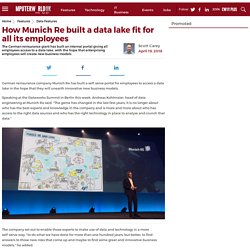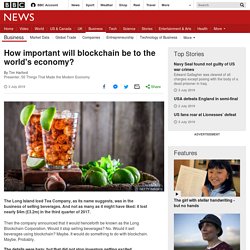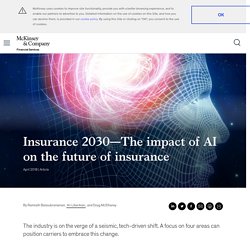

Expert View: AI is the future – we need to embrace it, and quickly. How Munich Re built a data lake fit for all its employees. Share Twitter Facebook LinkedIn German reinsurance company Munich Re has built a self-serve portal for employees to access a data lake in the hope that they will unearth innovative new business models.

Speaking at the Dataworks Summit in Berlin this week, Andreas Kohlmaier, head of data engineering at Munich Re said: "The game has changed in the last few years, it is no longer about who has the best experts and knowledge in the company and is more and more about who has access to the right data sources and who has the right technology in place to analyse and crunch that data. " The company set out to enable those experts to make use of data and technology in a more self-serve way, "to do what we have done for more than one hundred years, but better, to find answers to those new risks that come up and maybe to find some great and innovative business models," he added.
This means that it has very specialised underwriters who are increasingly reliant on data to help inform decision making. How important will blockchain be to the world's economy? Image copyright Getty Images The Long Island Iced Tea Company, as its name suggests, was in the business of selling beverages.

And not as many as it might have liked: it lost nearly $4m (£3.2m) in the third quarter of 2017. Then the company announced that it would henceforth be known as the Long Blockchain Corporation. Would it stop selling beverages? No. The details were hazy, but that did not stop investors getting excited. What is blockchain? Blockchain is the technology which underpins Bitcoin and other digital currencies. Media playback is unsupported on your device Blockchain may still be in its infancy, but venture capitalists are already pouring billions into start-ups with more clearly defined plans than the Long Island Iced Tea Company's. And billions more are being raised in the regulatory grey area of initial coin offerings, where companies raise money by selling digital currency to investors. So what problem is blockchain trying to solve, and should we believe the hype? Gx fsi dcfs 2019 insurance industry outlook. How QA Software Integrations Can Improve Customer Service.
The impact of AI on the future of insurance. Welcome to the future of insurance, as seen through the eyes of Scott, a customer in the year 2030.

His digital personal assistant orders him an autonomous vehicle for a meeting across town. Upon hopping into the arriving car, Scott decides he wants to drive today and moves the car into “active” mode. Scott’s personal assistant maps out a potential route and shares it with his mobility insurer, which immediately responds with an alternate route that has a much lower likelihood of accidents and auto damage as well as the calculated adjustment to his monthly premium. Scott’s assistant notifies him that his mobility insurance premium will increase by 4 to 8 percent based on the route he selects and the volume and distribution of other cars on the road. It also alerts him that his life insurance policy, which is now priced on a “pay-as-you-live” basis, will increase by 2 percent for this quarter. We strive to provide individuals with disabilities equal access to our website.
Distribution. 9 Emerging Insurance Industry Trends (2018-2020) 20% of all customers say their insurance provider has no customer tailored experience whatsoever.

Even if Bitcoin, Ethereum and Ripple don’t become the standard currencies of the future, the groundbreaking technology behind them is what the focus is on for the insurance companies. They have already started employing blockchain in their existing workflow to avoid huge losses because of false claims and scams that happen daily in the industry. The competition in the insurance industry is intensifying as markets evolve, existing players strive to innovate, and new ones enter the market, including ones that distribute only online or through non-traditional channels. As a result, cost optimization and customer retention are becoming critical. In addition, consumers are becoming more discerning, expecting an insurance customer experience on par with the consumer experience from leading online companies such as Amazon, Netflix, and Airbnb. 1. Ridesharing Revolution 2.